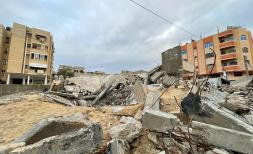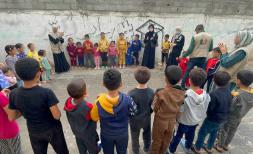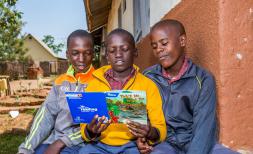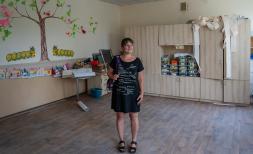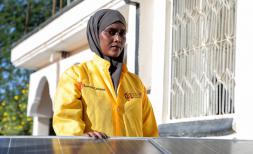COVID-19: School closures put decades of gains for Somali children at risk
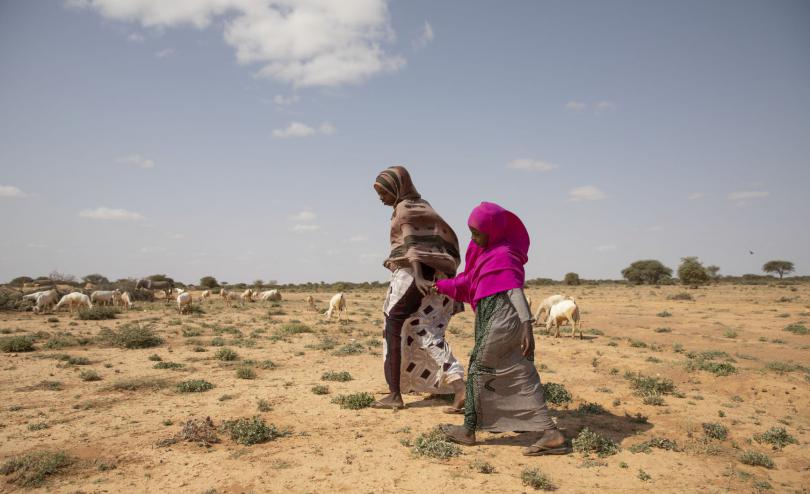
Late last year, 15-year old Sahra spoke at the Mogadishu Tech Summit about challenges children in Somalia are facing. In her brief, powerful speech, she dared a room full of men and women to find meaningful ways protect Somalia’s children.
As a 15 year-old Somali girl from Mogadishu determined to continue her education, the hurdles she would had to overcome to arrive on this stage in the country’s capital are remarkable.
When I caught up with Sahra again this year, I asked what gave her the courage. She said: “I have a very supportive family, who encourage me to study and work hard in school. I want to become a minister or an administrator. Somalia needs strong leaders to bring change, and I will be one of them.”
Soon after our meeting, COVID-19 hit Somalia, and schools were closed to prevent the spread of the virus. It has been over three months since doors were shut, and Sahra along with millions of other children have no idea when or if they will ever return to school.
School-closures have had a massive impact on children around the world but in Africa, this comes on top of years of pre-existing challenges that have excluded millions of children from accessing quality education. Even before the COVID-19 crisis, Sub-Saharan Africa had the highest rates of education exclusion, with more than one fifth of children aged 6-11 years out of school. Across Africa, an estimated 262.5 million children (some 21.5% of the student population)[1] are now out of school due to coronavirus.
The situation is even worse in Somalia. Before COVID-19 hit it was estimated that of the 4.5 million school-aged children, only 1.5 million children (35 per cent of girls and 41 per cent of boys) were in school, leaving well over 3 million school-aged children out of school.
Today, education experts estimate that an additional one million children don’t have access to any sort of learning and COVID-19 is preventing children from completing the academic year, in particular the end-of-year exams for Grade 8 and Grade 12. School closures have forced millions of children to miss out on their basic right to learn.
When the devastating drought and famine of 2011 hit six regions in Somalia, it affected at least 3.1 million people. Half of them were children, who were forced out of school, many after being displaced. At least 15% of the children affected by the famine never returned to learning according to the Somalia Education Cluster, meaning around 225,000 children never picked up learning again. We can assume a similar or worse scenario as this time, the whole country is affected.
“Three months since schools were closed, students still have no idea when they will resume learning. This is very discouraging for many children, and we fear they may give up their education and enter the workforce”, says Mengistu Edo Koricha, Head of Education for Save the Children in Somalia.
Mengistu says although the Federal Government of Somalia has developed comprehensive strategies to allow children to learn from a distance, most of the strategies are focused on online learning and use of mass media such as TV and Radio stations. The fear is that this will exclude thousands of children in Somalia, particularly marginalised and rural children who do not have access to these tools.
Prolonged school closures have already exposed more children to abuse and exploitation in the country. Save the Children has seen a spike in child right violations, with a particular increase in cases of female genital mutilation (FGM), sexual violence and child marriage. A recent report from the Social Norms and Practice Consortium[2] found that in the 13 districts where consortium works, 52 cases of FGM were reported in March and April, compared to 38 cases in January and February. With the majority of cases of FGM going unreported, the rise is a grave concern.
Cases of child marriage also appear to be on the rise as Save the Children case workers across the country reported an increase in the number of child marriages in their communities.
Children across the globe face similar challenges. Somalia, but other governments as well, must do more to ensure the education of children does not suffer from the COVID-19 pandemic.
Save the Children is calling for an increased funding of education, to ensure national COVID-19 plans respond to more than just the health crisis – they must make education a priority and ensure safe and accessible education for every child. Children who return to school should be able to do so safely, with access to school meals and health services. Curriculums must be adapted so that children can make up for their lost learning.
It is critical children like Sahra are protected, encouraged, and given back their dream to complete their education. Short of this, the education of a whole generation of children in Somalia and across the globe may be lost.
All over the world, Save the Children is rapidly adapting existing work whilst preparing for outbreaks of coronavirus in countries with limited capacity to respond. We've also launched the #SaveOurEducation campaign to tackle the global education emergency.
Read our new Save Our Education report.
[2] SNaP is a multi-year project implemented by International Rescue Committee, Care International and Save the Children and their national partners across 13 districts in Somalia. The Project is funded by UKAID.
